OLD POST ALERT! This is an older post and although you might find some useful tips, any technical or publishing information is likely to be out of date. Please click on Start Here on the menu bar above to find links to my most useful articles, videos and podcast. Thanks and happy writing! – Joanna Penn
I love the transparency of the indie world.
It's so important for us to share information so we can learn from each other. I've just finished my 2014 -2015 tax returns in the UK, so I wanted to share my breakdowns in the hope that it helps you with your author business.
How does my six-figure income break down?
First of all, I am an author-entrepreneur. All my income stems from my writing but I separate that into books and blogging-related, since the latter brings me speaking opportunities and affiliate income as well as direct sales.
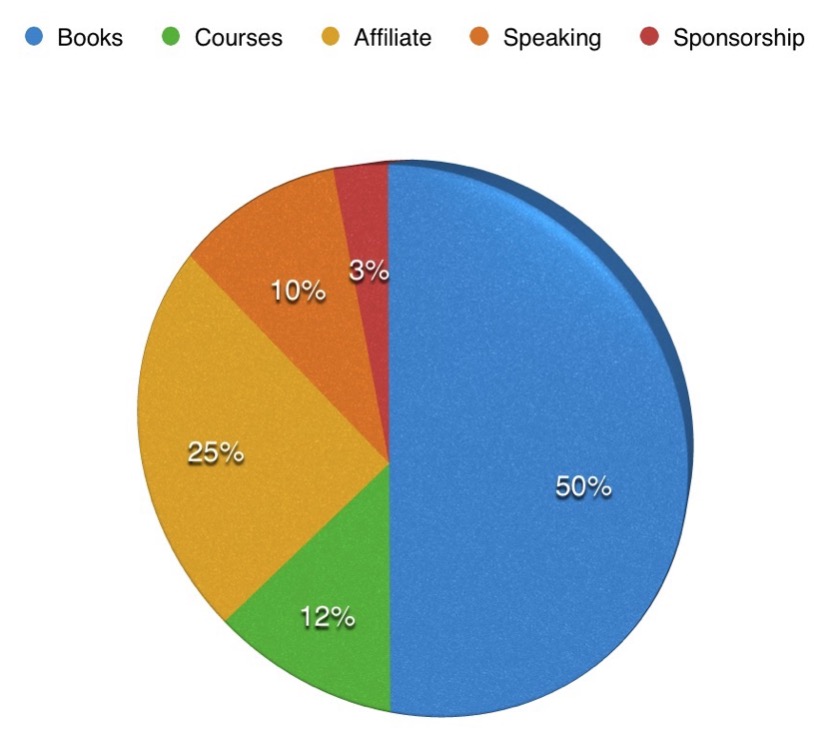
I won't specify exact figures, but in 2014, when I reported for the previous tax year, the income was just over 2x the UK average for a male, so it has improved.
The break down of income streams is shown in the pie chart:
- 50% book related income, which includes audiobooks and print as well as ebook sales on all retail stores. This would be a full-time income for many people on its own, and proves that you can make a good income as an author, despite what the mainstream media suggest (but then they never seem to survey indies!)
- 12% course sales from my own site
- 25% affiliate sales which is basically a commission on selling other people's products that I use and believe are useful
- 10% paid professional speaking
- 3% sponsorship for the podcast from corporate sponsors and Patreon
How does the book income breakdown by format?
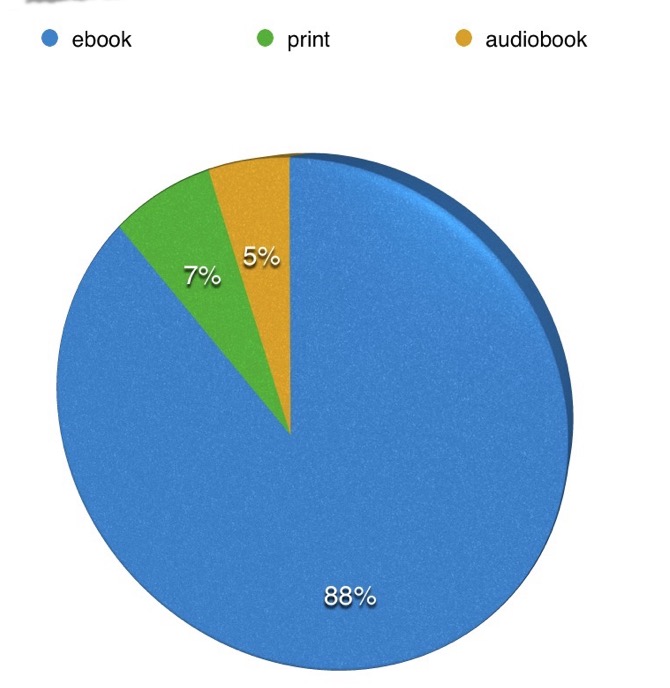
Clearly ebooks are dominant, as they are for any indie author. But I wouldn't be without my print sales either 🙂 They are mainly non-fiction sales.
What is more interesting is that a year ago, I had virtually no audiobook income. I am super bullish on audiobook growth over the next few years and have really been focused on growing that area. I have 10 books in audio so I expect to see that figure grow next year.
How does the book income breakdown by store?
I love Amazon.
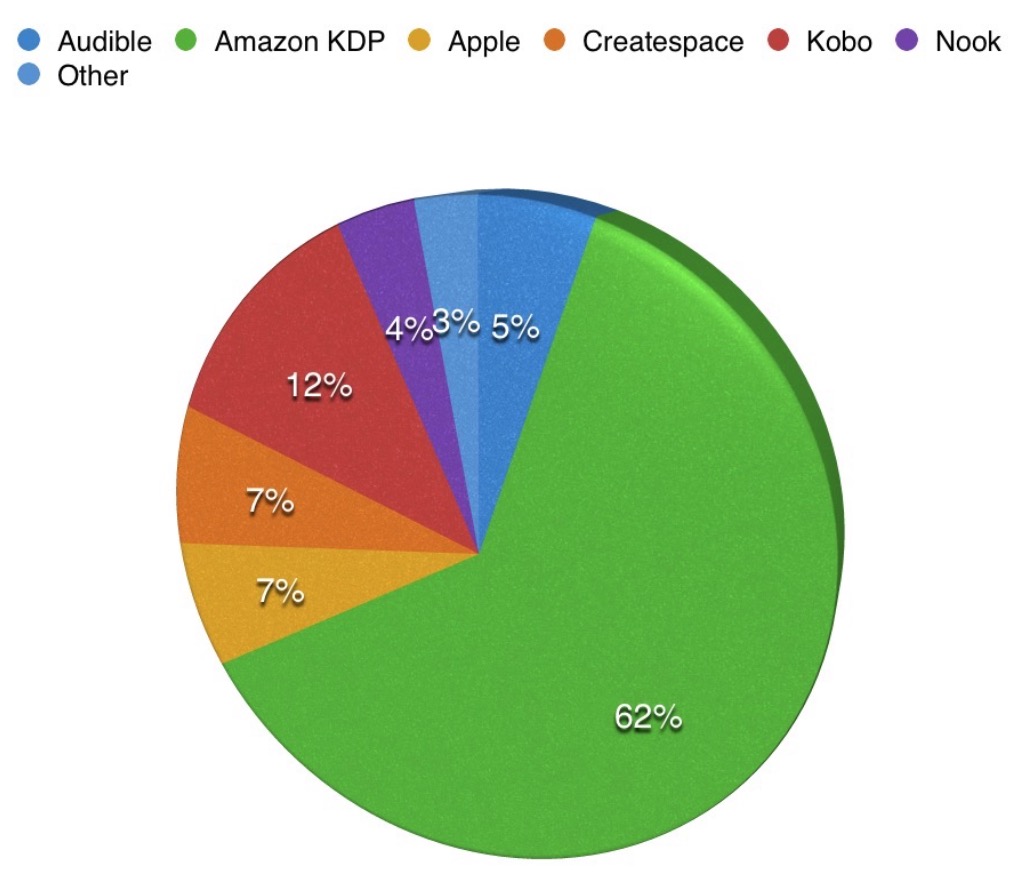
BUT, I don't believe in exclusivity for my book sales.
In 2008, I was laid off along with several hundred colleagues in one day during the global financial crisis. That was the last time I relied on one company for my livelihood. If selling books is not your main income, then fair enough 🙂
I also believe that, although Amazon may dominate in the US and UK, iBooks and Kobo specifically dominate in other countries and my income there continues to grow every month. Yes, they take some work to get moving, but in my opinion, it's worth it for the long term global market.
I go into more details on the pros and cons of exclusivity in this article, but obviously it's your choice.
How does book income break down by fiction vs non-fiction?
I now have 10 fiction books (plus a short story series) and 5 non-fiction books.
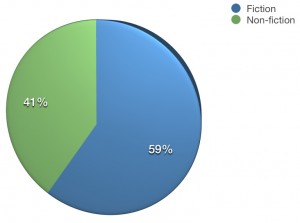
The first graph shows the % income for fiction and non-fiction. I make nearly 60% of my book income from fiction, which is pretty awesome actually as I've been working hard to develop a back-list.
The second graph shows the % sales volume for fiction and non-fiction.
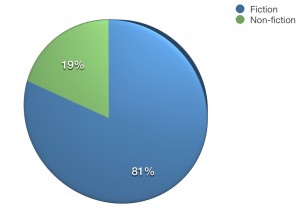
You can see that I sell far more fiction books than non-fiction, and I have taken out the free books so this is just for paid items.
In terms of pricing, I have books ranging from free through $2.99, $4.99 and all the way up to $8.99 on Amazon. On Kobo and iBooks I have boxsets at even higher prices as there is no cap on the royalty rate.
What am I planning for the next financial year?
Obviously more books!
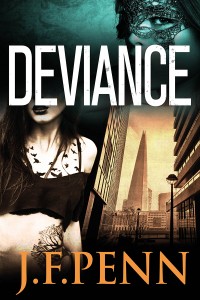
I also have the next ARKANE book roughly plotted out, working title, Destroyer of Worlds … and a load more to come … For non-fiction, I'm working on a book on mindset for authors. Busy, busy!
But the big change is that I am getting back into courses.
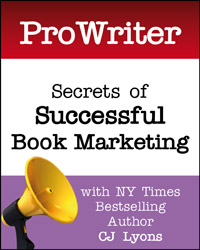
Those of you who have been around a while know that I have had a number of courses over the last 6 years. I started in 2009 with the Author 2.0 course, then I sold modular courses and then I did several joint venture courses with CJ Lyons, Roz Morris and Alan Baxter. I closed all previous courses in Dec 2014 for two reasons:
a) the EU VAT law that came into law on 31 Dec 2014 meant that I would have to go through painful hoops to sell direct in the way I had set everything up. The law only affects digital products that are electronically provided with minimal or no personal input. That meant I was liable for the new threshold. But if you have a personal element to the product delivery e.g. live webinars, then the usual VAT threshold applies and since most of my income is from the US, that doesn't apply. More here if you want the gory details on the tax rate. I will be including a personal element in future products, so future stuff won't be affected.
b) the courses were dated. They were super 🙂 of course, but it was time to close them down. Those of you who bought the courses still have access to them, but it's time to reinvent my teaching.
c) I was overwhelmed and wanted to focus on my books, especially my fiction, and didn't feel I had time for everything.
What's changed?
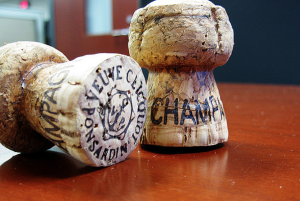
This makes a huge difference as I now have help with the technical side of things and can focus on creation. He will also be doing a lot of the customer side of things and it means we can get back into courses.
I get so many emails every day and I am so passionate about teaching what I learn that it's crazy NOT to do courses again. I can't physically speak everywhere and this introvert also does better alone in front of the computer than with crowds. (I do emerge occasionally, honest!)
I want to share how to do everything and help YOU write, publish and market your books as well as build a business. I also want to be able to retreat to my writing cave and create stories 🙂
So, there are courses to come soon as well as a community for those who are serious about building a business as an author.
The first will be the Creative Freedom course – and you can watch a FREE video series where I start to go through the top questions people ask.
Video 1 is 11 ways to make money as an indie author and Video 2 is 7 ways to find time to write and build your author business. Click the image below to get the first free video.
OK, that's about enough for this year. THANK YOU for your support and I'm super pleased to be able to continue helping as much as I can on your author journey.
Please feel free to ask me any questions about this in the comments below.
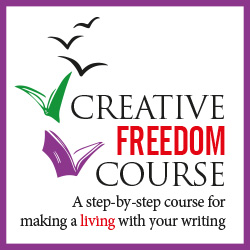
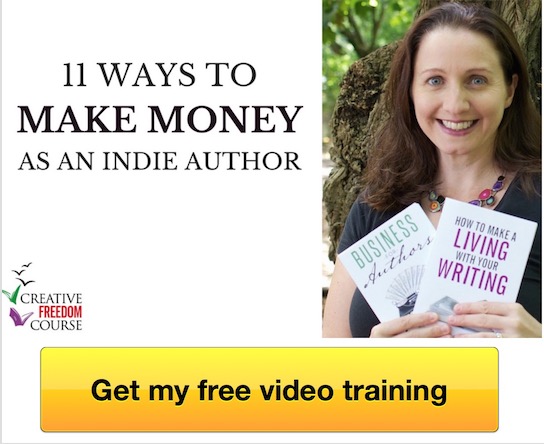


Thanks for sharing so much detail about your sales figures, its interesting to see how they break down. Mine are children’s picture books so in many ways the panorama is very different but I eagerly follow your posts because they are always substantial. Thanks. Beck.
It’s always a joy to learn from these posts! I visit the Creative Penn daily to learn!
This data is so helpful, especially regarding ebook sales. Thank you! And congrats for adding your husband to the business. So cool!
Thanks 🙂
I found your website a few weeks ago while searching for Scrivener tutorials. I can not express how thankful I am that I found you. Your advice is priceless. I have since bought all but one of your non-fiction books. I got print versions because I prefer to read non-fiction that way.
I have also purchased Desecration and taken advantage of your free ebooks. You have changed the way I think about self-publishing. I do have a traditional book deal, but I have so many other ideas that I will definitely be going down the self-publishing route, once they are ready.
Thanks Natalie and I’m so pleased to have changed your mind about self-publishing. Just make sure your trad pub deal allows you to self-publish if you want to 🙂 I recommend checking out this book for help on clauses to watch out for: http://amzn.to/1KW8IsT
Thanks Joanna I will.
Love this, Joanna! Thank you for sharing! It really IS possible for writers to prosper and live off their writing!
absolutely 🙂 I know you know this too!
Great blog Joanna, a lot of useful figures in there.
I had two questions (I understand if you can’t offer definitive answers)
What are some of the affiliate deals you have? (if you’re able to share that)
Do you have any personal tips on finding the right affiliate deals?
Keep up the great work!
Hi Gary – you can see a lot of them here: http://www.thecreativepenn.com/tools/ and another example would be the author website stuff with bluehost – http://www.thecreativepenn.com/authorwebsite/ – also I’m an affiliate of Nick Stephenson, Chandler Bolt, Scrivener Coach, Author Marketing Club, Amazon, iBooks and others – there is a disclaimer on the sidebar ->
Basically I promote any services I think are useful and that I use myself – which is basically my criteria for choosing affiliates.
In the video on 11 ways to make money as an indie author, I include affiliate income: http://www.thecreativepenn.com/freedom
I hope that helps 🙂
Thanks so much for sharing this encouraging information and “opening” your books for us. A rising tide raises all ships and that includes us as indie authors!
Joanna,
Congrats, you deserve all of this for the hard work and value you bring.
It’s so exciting to see how you have progressed and are now able to have your husband working with you in the business!!!
Here’s to your continued success!
Thanks Shawn and I am excited to see what happens in the next year 🙂
Cool! I’ve been a casual observer, but supportive, of the whole indie author movement for a few years now. I’m now taking far more positive steps to move myself in that direction. Always good to learn good info like this.
One thing that has moved me in this direction is something said by a writing friend — he’s a professional novelist/editor of the traditional variety. He recently made a comment that moving to indie is really only helpful/beneficial for traditional writers who already have an audience, that if you haven’t an audience, it won’t do you any good. Total rubbish, of course.
What really convinced me that he knew less about indie publishing than I did, however, was when I discovered that he had 5(!) novels that are out of print, and the rights have already reverted to him. Has he taken advantage of the e-publishing revolution, though? Absolutely not. This makes no sense to me. Although 20 years old, these novels are perfectly fine. I’ve read one of them, in fact. They’ve already been edited, so he doesn’t have that expense. All he needs to do is to have fresh cover art created for them, and have them converted to ebook format. And — voilà! — he has five new streams of income from those books. Convert them to audio books, and there’s another small income stream from each book.
Instead, his books are being sold as used copies via Amazon, earning OTHER people money and nothing for himself. Ridiculous. But, hey, if that’s how he wants to do it, good for him. I wouldn’t do it that way.
I attended the online conference Chandler Bolt put together. I really enjoyed your interview and the things you said, as well as the great information put together by Nick Stephenson. I’m now hard at work on some short stories. My plan is to start with a couple of small anthologies — one I’ll put up for free on Amazon, and the other I’ll offer for free on my site (which I’m working on) to build my email list — and I’ll also write some more short stories to try to sell to print and online magazine markets, largely to see if I can gain any readers that way (probably only a little, I suspect), but also to make my name known in wider circles, and, of course, for the little bit of income that such sales would garner. Meanwhile, I’ve been planning and researching a novel I have in mind.
My genre is fantasy — some historical, of the gaslamp variety (the fantasy version of steampunk), but some more high fantasy — although I could easily see myself writing some non-fiction, too.
Hi Gary, it sounds like you know what you’re talking about 🙂
I really see a lot of opportunity for any rights holders – but only if they take an entrepreneurial attitude and exploit them. The backlist IS powerful but there are always new authors starting out.
I’m glad you enjoyed the summit – I learned a lot from it too. This industry is full of people sharing great info 🙂 all the best with your writing.
Hi Joanna,
Thanks for sharing. Fascinating to see all the numbers stuff. 🙂
Meg
thank you so much for being so transparent and willing to share! while i loved all the charts, my favorite part was that you were able to hire your husband out of his day job 🙂 that just made me so happy lol i hope to be able to do the same thing one day
It’s been one of my goals for nearly 4 years, so very pleased to have reached this point – it’s taking some adjustment, but it’s going to be awesome 🙂
Hi Joanna!
I have a question about pricing. Given the underlying stigma about indie publishing, (You’ve done a wonderful job clearing that up, by the way, but sadly not everybody reads your blog.) and the fact that indies tend to price their books at a much lower price than traditionally published authors ($.99 to 2.99 in most cases I’ve seen), is it better to price your book higher to avoid the indie stigma? In other words, which has a more profound effect on buyers, a cheap price or a “professional” looking one? (does that make sense?) Does a cheaper price outweigh the stigma against indies? BTW, this is assuming that everything else (cover, description, etc) all looks very professional and could pass for a traditionally published book.
Thanks!
Plenty of traditional publishers are pricing their books at low prices, and plenty of indies price their books high. I don’t believe in a stigma of price, I just think that there are customers at different levels. You can choose to price your books at whatever you like. My books are at free, $2.99, $4.99, $6.99, $8.99 and I even have some at $12.99 on iBooks and Kobo. Basically, you need more than one book so you can spread your prices around, but if you are new on the scene, whether trad or indie, you are always going to need to price at a rate that means people will risk trying a new author.
Thanks Joanna! You’re so helpful, as always.
Joanna! Thanks so much for these posts! These are so very helpful and I love learning how to make my dream of reality!
This is brilliant, thank you! So many people seem to be cagey about what they earn, as if by telling other people about it, they’ll jinx it – or the other people might somehow steal it! It’s always interesting to see how someone manages to amass a six-figure income!
Great post, Joanna! Thanks so much for showing all your numbers. It really helps get a good picture of what can be accomplished. I’m a regular listener of your podcast (I’ve tweeted at you several times upon completing a podcast to share my thoughts) and you have such great information to share there too. It’s great to see things change through and around you. Wishing you luck with this next leg of your journey! Would love to hear how hiring your husband helps with your business 🙂
PS) I’m always in the gym when I listen so I’ve never sent a pic. All you would see is weight lifting equipment. Lol.
good call on the gym photos 🙂 and thanks for the support of the podcast!
Hi Joanna, thanks for your breakdown, it helps build confidence in the power of book sales. It was good to know 50% of your income comes from your books. Bought your newest – on my to read pile, and it keeps nudging its way up 🙂 I like your new series London Psychic – I see you say it’s a trilogy, but I do hope you’re able to extend that. I think these characters are powerful. Thanks for sharing.
Thanks Elisabeth – and I can definitely continue the characters of Jamie and Blake but I wanted to round the particular story arcs of those books. I have a Blake stand-alone in mind …
Congratulations, Joanna! You’ve worked so hard you certainly deserve the success you’ve attained. I have one question: Do you think Yaro Starak’s blogging course helped you to achieve this type of success? Obviously, the course itself would do nothing without the necessary ingredient of your hard work. But I’m just wondering. Anyway, kudos to you!!
Hi Frances – my very first foray into the internet world was doing Yaro’s course way back in 2008/2009. Joel Friedlander also did the same course back then and is doing way better than me 🙂 although Joel took a different path. I would say that the course was what I needed back then and probably still is amazing, but I haven’t done it since then. I’m sure it’s been updated though and Yaro is still a brilliant teacher 🙂
Thank you for sharing this information. I saw you have several foreign editions for your books. How did you go about getting them translated?
Hi Janet, I’ve written about translation here: http://www.thecreativepenn.com/self-publishing-translation/
I would say that it’s not been worth it though – and now I have an agent who is looking into foreign rights for me.
So. How do you get those titles moving on those other platforms, such as iTunes, Kobo, etc?
Hi Louis,
I’ve gone through this on the podcast before but basically you need multiple titles, preferably in a series, preferably with something permafree to attract readers. You need to link to the other stores from your site and promote the books in the same way as you promote Amazon links, which most authors don’t. You should have great covers and preferably some higher priced books that you can discount in their sales/merchandising opportunities. Plus, meeting the reps at events is a good idea. Hope that helps.